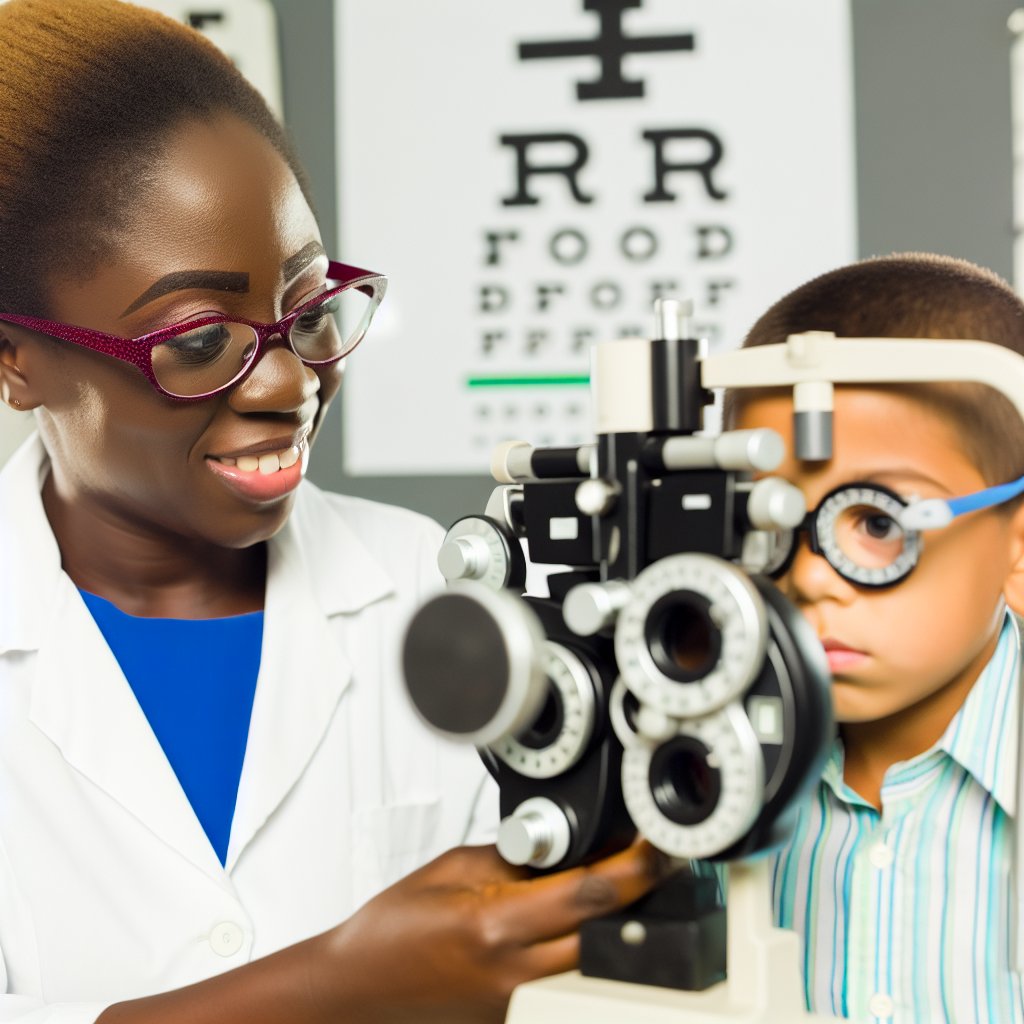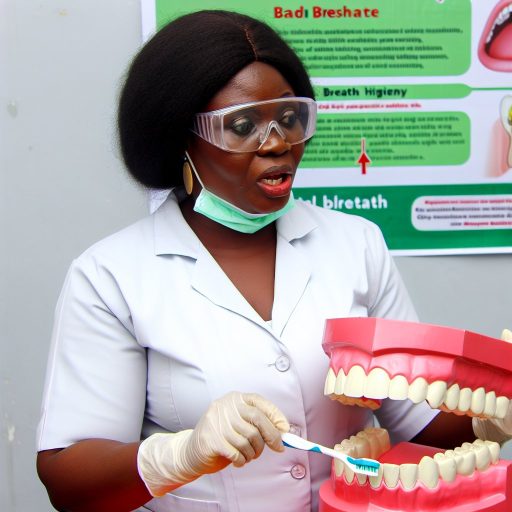Eye Care for Children in Nigeria
Eye care for children is crucial for their overall development.
In Nigeria, eye problems are prevalent among children.
Regular eye check-ups are essential for early detection of any issues.
Children should be encouraged to eat a healthy diet rich in vitamins and minerals.
Limiting screen time on devices can help prevent eye strain and damage.
Protecting children’s eyes from UV rays with sunglasses is important.
Educating parents on the signs of eye problems and when to seek professional help is essential.
Providing proper lighting and ergonomic study environments for children can aid their eye health.
Emphasizing the importance of outdoor play and physical activity contributes to eye health.
Addressing the stigma associated with wearing eyeglasses, if needed, is important.
Common eye problems in children:
Myopia (nearsightedness): Children with myopia have difficulty seeing objects at a distance.
Hyperopia (farsightedness): Children with hyperopia struggle to see objects up close.
Amblyopia (lazy eye): This condition occurs when one eye is weaker than the other, affecting vision.
Strabismus (crossed eyes): A condition where the eyes are misaligned and point in different directions.
Color blindness: Some children have difficulty distinguishing between certain colors.
Children’s eye care is crucial as these common problems can affect their development and quality of life.
It’s essential for parents to be aware of these issues to ensure early detection and appropriate intervention.
Signs of eye problems in children:
- Squinting or rubbing eyes frequently
- Excessive tearing or redness in the eyes
- Complaints of headaches or eye pain
- Difficulty focusing or following objects
- Lack of interest in visually stimulating activities
If you notice any of these signs in your child, it’s important to schedule a comprehensive eye examination with a qualified eye care professional.
Early detection and treatment can prevent further complications and improve your child’s vision.
Preventive measures for children’s eye care:
- Ensure your child eats a balanced diet rich in eye-healthy nutrients like Vitamin A and Omega-3 fatty acids.
- Encourage outdoor activities to reduce the risk of myopia.
- Limit screen time and ensure proper lighting when using electronic devices.
- Provide protective eyewear when engaging in sports or activities that pose a risk of eye injury.
- Schedule regular eye check-ups to monitor your child’s vision and address any issues promptly.
By incorporating these preventive measures into your child’s routine, you can help maintain their eye health and prevent potential problems in the future.
Remember, as a parent, you play a crucial role in safeguarding your child’s vision and overall well-being.
Being aware of common eye problems in children, recognizing signs of eye issues, and taking preventive measures are essential aspects of caring for your child’s eyes.
Your proactive approach can support your child’s visual development and ensure they have optimal eye health.
Regular eye check-ups are key to early detection and management of any eye conditions.
Prioritize your child’s eye care today for a brighter and clearer tomorrow.
Signs that may indicate a child has an eye problem:
As a parent, it is essential to be aware of signs that may indicate your child has an eye problem.
These signs can vary from subtle to more obvious indicators that should not be ignored.
Being vigilant and observant of your child’s behavior can help in early detection and timely intervention if there is an issue with their eyesight.
Squinting or rubbing eyes frequently:
If you notice your child squinting or rubbing their eyes frequently, it could be a sign of eye strain or a vision problem.
This behavior indicates that your child may be trying to compensate for difficulty in seeing clearly.
Complaints of headaches or eye pain:
Children may not always communicate their visual discomfort effectively.
If your child complains of frequent headaches or eye pain, it could be a sign of an underlying eye issue that needs attention.
These symptoms should not be dismissed and should prompt a visit to an eye care professional.
Holding objects close to face to see them better:
If your child consistently holds objects close to their face to see them better, it could indicate nearsightedness or other refractive errors.
This close-up focusing is a common compensatory mechanism for children with uncorrected vision problems.
Difficulty reading or focusing on near or distant objects:
Struggling with reading or focusing on objects at different distances can be a sign of various eye conditions, such as astigmatism, farsightedness, or convergence insufficiency.
If your child shows difficulty in these tasks, it is crucial to have their vision assessed.
Red or watery eyes:
Redness or excessive tearing in the eyes can be a symptom of several eye issues, including allergies, infections, or dry eye syndrome.
It is essential to investigate the underlying cause of these symptoms to rule out any vision problems that may be affecting your child.
Find Out More: The Future of Restorative Dentistry in Nigeria
Transform Your Career with Expert Guidance
Get personalized mentorship consulting that’s tailored to your unique path. Our expert advice is actionable and exclusive.
Get StartedImportance of Regular Eye Exams for Children:
Regular eye exams are crucial for children as they help in early detection and treatment of eye problems.
Here are some reasons why parents in Nigeria should prioritize eye care for their kids:
- Early Detection and Treatment of Eye Problems:
- Preventing Potential Vision Loss or Complications:
- Ensuring Proper Visual Development and Learning Abilities:
By scheduling regular eye exams for your children, any underlying eye issues can be detected early and treated promptly.
This is important because many eye conditions, if left untreated, can worsen over time and lead to serious vision problems.
Regular eye exams can help prevent potential vision loss or complications that may arise from conditions such as refractive errors, amblyopia (lazy eye), or strabismus (crossed eyes).
Timely intervention can make a significant difference in preserving your child’s eyesight.
Children’s vision plays a crucial role in their overall development, particularly in their ability to learn and navigate the world around them.
Undetected vision problems can hinder academic performance and social interactions.
Regular eye exams can ensure that your child’s visual system is developing properly, enabling them to reach their full potential.
Regular eye exams are essential for maintaining good eye health and ensuring optimal visual function in children.
Parents in Nigeria should make it a priority to schedule routine eye check-ups for their kids to safeguard their vision and overall well-being.
Discover More: Impact of Climate on Parasitic Diseases in Nigeria
Tips for Maintaining Good Eye Health in Children:
- Encouraging outdoor play time to reduce the risk of myopia.
- Limiting screen time and taking breaks to rest eyes.
- Providing a balanced diet rich in vitamins and nutrients.
- Ensuring proper lighting in study and play areas.
As parents, it is essential to prioritize your child’s eye health from a young age.
By incorporating these tips into your child’s daily routine, you can help promote healthy vision and prevent potential eye problems in the future.
One of the most effective ways to maintain good eye health in children is by encouraging outdoor playtime.
Studies have shown that spending time outdoors can help reduce the risk of myopia, also known as nearsightedness.
The natural light and distant focus that outdoor activities provide are beneficial for children’s eyes.
In today’s digital age, limiting screen time is crucial for protecting your child’s eyes.
Excessive screen time, whether it’s from phones, tablets, computers, or television, can cause eye strain and discomfort.
Encourage your child to take breaks every 20 minutes to rest their eyes and reduce the risk of developing digital eye strain.
A balanced diet plays a significant role in maintaining good eye health.
Foods rich in vitamins A, C, and E, as well as omega-3 fatty acids and zinc, are essential for healthy eyes.
Incorporate fruits, vegetables, nuts, seeds, and fish into your child’s diet to ensure they are getting the necessary nutrients for optimal eye health.
Proper lighting is critical for reducing eye strain and fatigue, especially in study and play areas.
Ensure that the lighting in your home is bright but not harsh, and positioned to reduce glare and shadows.
Good lighting can help prevent eye strain and make it easier for children to focus on their tasks without putting extra stress on their eyes.
By following these tips and making your child’s eye health a priority, you can help set them up for a lifetime of healthy vision.
Remember, regular eye check-ups with an eye care professional are essential for early detection and treatment of any potential issues.
Your child’s eyes are precious, so take the necessary steps to protect and maintain their vision for years to come.
Explore Further: Career Opportunities for Dental Therapists in Nigeria

5 Proper Ways to Protect Children’s Eyes:
- Using protective eyewear during sports activities
- Teaching proper hygiene to prevent eye infections
- Keeping hazardous chemicals and objects out of reach
- Regularly cleaning and sanitizing contact lenses
Protecting children’s eyes is crucial for their overall well-being and development.
Here are five proper ways to ensure that your child’s eyes are kept safe and healthy:
Using Protective Eyewear During Sports Activities
When children engage in sports activities, such as soccer or basketball, it is essential to make sure they wear appropriate protective eyewear.
This can help prevent injuries to the eyes caused by flying objects or accidental collisions with other players.
Teaching Proper Hygiene to Prevent Eye Infections
Teaching your child proper hygiene practices, such as washing their hands before touching their eyes, can help prevent the spread of eye infections.
Encourage your child to avoid rubbing their eyes with dirty hands to reduce the risk of irritation and infections.
Keeping Hazardous Chemicals and Objects Out of Reach
Children are naturally curious and may explore their surroundings by touching or playing with objects they find.
To prevent eye injuries, it is essential to keep hazardous chemicals, sharp objects, and small toys out of reach.
This can help reduce the risk of accidents that could harm their eyes.
Regularly Cleaning and Sanitizing Contact Lenses
If your child wears contact lenses, it is crucial to teach them proper cleaning and sanitization techniques.
Ensure that they wash their hands before handling their lenses and follow the recommended guidelines for cleaning and storing them.
Regular cleaning can help prevent eye infections and ensure optimal eye health.
Discover More: Traditional vs Modern Mental Health Treatments
The Role of Nigerian Parents in Promoting Eye Care for Children
Nigerian parents play a crucial role in ensuring the proper eye care for their children.
By taking proactive steps and educating themselves about common eye problems, they can significantly impact their children’s vision health.
Educating Themselves About Common Eye Problems and Their Symptoms
- Understanding common eye issues like myopia, hyperopia, and astigmatism.
- Recognizing symptoms such as frequent headaches or squinting.
- Seeking medical advice promptly if any signs of concern arise.
Prioritizing Regular Eye Check-ups for Their Children
- Scheduling annual eye exams with a qualified optometrist.
- Ensuring that their child’s vision is tested at an early age.
- Monitoring any changes in their child’s eye health over time.
Being Proactive in Addressing Any Signs of Potential Eye Problems
- Noticing any changes in their child’s behavior or eyesight.
- Seeking immediate medical attention if there are symptoms of eye strain.
- Following through with treatment recommendations from eye care professionals.
Setting a Good Example by Practicing Healthy Eye Habits Themselves
- Wearing sunglasses to protect eyes from UV rays.
- Taking breaks from screens to reduce eye strain.
- Eating a balanced diet rich in eye-healthy nutrients like Omega-3 fatty acids.
Nigerian parents can empower their children by prioritizing eye care and setting a positive example of healthy vision habits.
By taking these proactive steps, they can contribute to their children’s long-term eye health and well-being.
Prioritize Eye Care for Children
Nigerian parents must prioritize eye care for their children.
Regular eye check-ups can help detect and address any issues early on.
By taking proactive steps, parents can prevent potential vision problems.
They can also promote overall well-being through good eye health.
A child’s vision is crucial for development and learning abilities.
Do not overlook the importance of regular eye care.
Additional Resources
NATIONAL SCHOOL EYE HEALTH GUIDELINES
Why we must prioritize children’s eye health worldwide | World …




